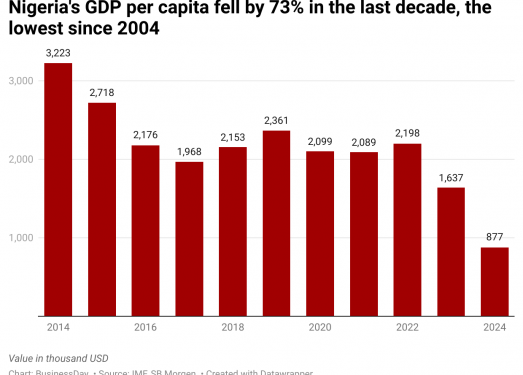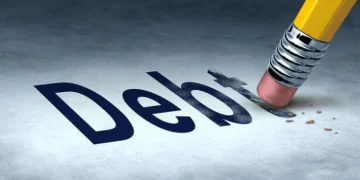Nigeria’s Per Capita Income Hits 20-Year Low on Weak Economy
Per capita income earned by an average Nigerian has plummeted by a staggering 72.8 percent, the lowest since 2004.
The slump is as a result of policy missteps made in the last decade that have weakened the Nigerian economy and worsened citizens’ living conditions, according to SB Morgen, a Lagos-based data and intelligence gathering firm.
The per capita income stood at approximately $3,223 in 2014, but recent estimates by the International Monetary Fund (IMF) indicate it has plunged to $877 this year. This dramatic decline, one of the sharpest in the region, shows a weakened economic resilience in the face of internal and external pressures.
“Nigeria’s GDP per capita has fallen to its lowest level since 2004 when placed against its smaller neighbours,” a recent chart by SBM revealed.
But while Africa’s most populous nation has seen its average income earned per person nosedive in the last 10 years, per capita incomes of West African peers like Ghana, Cote d’Ivoire and even Benin Republic have been modest.

“Nigeria is the only country in the sample whose income per head has dropped since 2014 and the only one whose income per head has risen in double digits since the year 2000,” SBM Intel said.
“Given that the same global headwinds affecting Nigeria affect all of these ECOWAS countries along the Gulf of Guinea, this is ample evidence of poor policy-making in Nigeria over the last decade,” it added.
According to Adeola Adenikinju, president of Nigerian Economic Society and professor of Economics, Nigeria’s GDP per capita has underperformed not just in the last decade but since 1960.
“Nigeria’s GDP per capita in 1960 was about $230 and twice that of China and higher than that of India. But if you fast forward to 2023, the country’s per capita income is just 7 percent that of China,” Adenikinju said.
Nigerians’ average income is depleting as its economy is also tanking as a result of low growth and lack of productivity. The Nigerian nominal GDP, once biggest in Africa, slipped to $285 billion in 2024, making it fourth largest in Africa.
Samuel Sule, the CEO of Renaissance Capital Africa, attributed the decline in Nigeria’s per capita income to the fall in GDP (in USD terms) driven by economic policy and a rise in population.
“Nigerians are less well-off and have lower standards of living in the last decade or compared to many other frontier markets, including our African neighbours,” he said.
Currency devaluation, inflation eroding per capita income
The primary drivers of persistent fall in Nigeria’s GDP per capita are the free fall of the naira and the rising inflationary pressures eating up savings and spending power, according to Michael Adeyemi, an Economics lecturer at Lagos State University.
The value of the naira has seen a sharp decline in the last decade, with the official exchange rate moving from around N150 per U.S. dollar in 2013 to over N1,700 per dollar today.
This devaluation has led to higher import costs, pushing up prices on essential goods and reducing purchasing power. Coupled with double-digit inflation, which stood at 32.7 percent in September, the average Nigerian household has seen its real income shrink substantially.
The consequences of this downturn in the country’s economic trajectory are grave. According to the most recent report by the World Bank on Nigeria, about 129 million of the citizens are living in poverty for a population of an estimated 238 million people.
A continued disparity in income inequality could exacerbate social unrest and tension as more Nigerians feel marginalised.
How can Nigeria get back on track?
The rising tide of poverty and widening inequalities occasioned by a falling per capita income can be calmed by ensuring policies that stimulate growth and encourage runaway investments into the country, according to Adenikinju, cited earlier.
He stated that productive growth of the Nigerian economy has been negative for the past years as inconsistent policies, high energy cost and hostile business environment are hurting investor confidence.
“We have policies that are not conducive for growth. There are also corruption and even the underperformance of the oil sector. On the efficiency side, we have not done well,” the former member of the Monetary Policy Committee of the Central Bank of Nigeria (CBN) said.
For Ibrahim Rafiu, a financial analyst and economist, the slowing GDP per capita can be turned around if the country diversifies and invest more in the non-oil sector.
“Diversification is key to reducing the country’s economic vulnerabilities,” he said.
“Investments in agriculture, technology, and manufacturing could stimulate job creation and foster economic resilience against oil price shocks. For example, supporting local agriculture can reduce food import reliance and keep prices more stable for consumers,” the university lecturer added.








